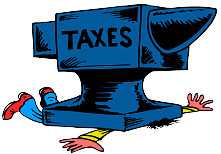
There's really no sure way to avoid an audit. Most audited tax returns are selected for review either because the filer is part of a target group or because a computer program selects the return. The computer selects many returns randomly, but there are red flags that will draw the IRS's attention.
The key is to minimize your exposure. Here are some suggestions from MSN Money on things you should try to avoid:
1. Math mistakes
The biggest reason people receive letters from the IRS is addition or subtraction goofs. Fortunately, math errors rarely lead to a full audit. Still, double-check your math before you send in your return.
And if you receive a letter from the IRS that says you owe them, check your numbers first. Sometimes, the IRS misreads one of your numbers, or the number is keyed incorrectly into the IRS computer. If it's wrong, send a letter with a printout of your calculations.
2. Mismatched interest and dividend reporting
If the amounts reported in supporting documents don't match the amounts on your return, you will get a letter.
There are lots of possible errors here. Sometimes, the IRS will enter the Form 1099 information into its computer and erroneously keystroke the income amount or the Social Security number of the recipient. If the income isn't yours, get a letter from the bank or other payer and forward that letter to the IRS. If the amount is incorrect, send a copy of the Form 1099 mailed to you by the payer.
3. You're on the IRS hit list
Those who receive much of their income in cash are traditionally on the radar screen of IRS agents looking for unreported income. Recently, the IRS has also pinpointed small-business owners and the self-employed in its bid to find more of the estimated $345 billion in uncollected taxes.
4. You've got a big mouth
Never brag about how you put one over on the IRS. Internal Revenue Service informers can earn a reward of between 15% and 20% of the additional tax collected, including fines and penalties and interest. Whistleblowers can file Form 211 or call the IRS hotline at 1-800-829-0433. Everyone else: Zip it, and keep your accounting strategies to yourself.
5. You're exceptional
An IRS computer program compares your deductions to others in your income bracket and weighs the differences. This secret IRS formula, called the "DIF Score," is used to select returns with the highest probability of generating additional audit revenue.
The IRS is coming
If you are facing an audit, don't panic. An audit is merely a process where the IRS asks you to substantiate the numbers on your tax return. Here are some survival strategies:
Call your tax professional. Or get one. If the audit is simple - to prove your charitable and interest deductions, for example - you can do it yourself by mailing in copies of your substantiation. For all in-person audits, I strongly suggest professional representation.
Plan your taxes to preempt an audit. If, say, you have a huge medical deduction that you feel would increase your chances of being audited, attach copies of your medical bills to your return. The IRS computer will still kick out your return, but when a real person looks at it, the reviewer will recognize that you know the rules. This may actually reduce your odds of a full audit.
Keep records for three years. The IRS can audit you for three years after you file your return. In reality, however, most returns are audited within 18 months. This gives the IRS time to do the review and request the appropriate substantiation before the statute of limitations (usually the three-year period) ends.
Once the deadline has passed, the IRS normally cannot audit your return and your expenses are insulated from examination.
File at the last minute if you are concerned about a potential audit. It won't hurt and might decrease your chances of being selected. The good news is, if you are audited one year with a refund or no change, it decreases your odds of being audited in subsequent years. In fact, if you are audited on the same items two years in a row with no additional taxes due, the IRS manual specifically recommends that they not audit you on the same items for a third year. Full Story

Comments (2)Subscribe to CommentsComment